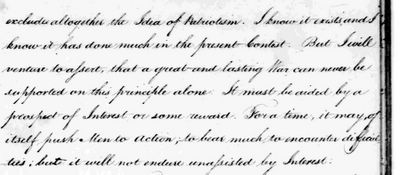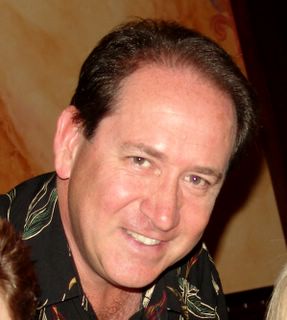Patriotism: Dickey talks with John Gregory Dunne

George Washington Papers at the Library of Congress,
1741-1799: Series 3h Varick Transcripts
George Washington to John Banister, April 21, 1778
I do not mean to exclude altogether the idea of patriotism. I know it exists, and I know it has done much in the present contest. But I will venture to assert, that a great and lasting war can never be supported on this principle alone. It must be aided by a prospect of interest, or some reward.—George WashingtonWell we know that NOW! Washington was writing about the Continental Army in the winter of 1778 at Valley Forge. He describes requests for furloughs coming fast and furious with word of enemy British soldiers getting a handsome compensation from their government. US officers were paying expenses out of their own pockets, and Washington was seeing gloomy handwriting on the wall.
The implications for the present quagmire in Iraq, of what the Father of Our Country wrote 228 years ago, are stunning in their immediacy. What is not comparable is how the notion of “patriotism” plays out in both scenarios.
These questions surfaced for me in the course of several emails between me and my friend Christopher Dickey regarding his latest Newsweek column, Wars of Hate another entry in his “Shadowland” series. His beautiful reminiscence of his last dinner with friend and renowned author John Gregory Dunne is intriguing for what is left, fatefully, to the imagination.
Partly because Chris just found a lost diskette of newspaper clippings Dunne gave him at that time, and concurrent with the publishing of Dunne’s wife of forty years, Joan Didion’s, memoir of the loss of her husband and daughter within months of each other, "The Year of Magical Thinking," he has described their conversation relating to events of the day, and Dunne’s ideas on
“Patriotism.”
I will not reveal the eloquent conclusion Chris draws for himself on the meaning of patriotism in the context of his remembrance of his dining with Dunne. The relation of Washington’s plight, and his plea for adequate support for his troops, to the occupation of Iraq, with the present-day ill-equipped soldier illuminates the meaning of “patriotism” with a clarity absent in the ambient public discourse.John was interested in patriotism. He was fascinated by the real substance of it, which he saw as diametrically opposed to what he called “the spectator patriotism” exploited by the Bush administration as it went looking for wars...
…John would rage. He was articulate and funny then and always, but such was his passion that I remember him as almost inchoate when he talked about the bastards who wouldn’t end their Global War on Terror, which was conceived in rhetoric and dedicated to their re-election, yet would send America’s sons and daughters on futile errands of suffering and slaughter. John said he was going to write a book about patriotism, but he had a novel to finish first, and then he died.—Dickey
Patriotism itself may be a romantic relic of past eras, especially with today’s “age of information” immediate access to goings-on anywhere on the planet—I can instantly empathize with the child being pulled out of the rubble in the earthquake tragedy in remote Kashmir as it plays out on cable news.
Perhaps “patriotism” needs to be hooked into a new world view, which is just that—a view of us all as citizens of the world, patriotic to our mutual goals of "life, liberty, and prosperity."

No comments:
Post a Comment
Comments signed Anonymous will not be published.